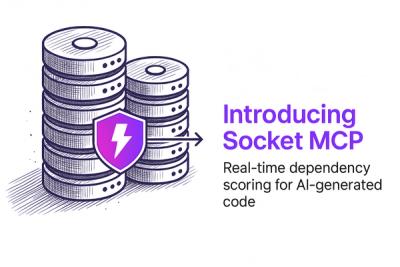
Product
Secure Your AI-Generated Code with Socket MCP
Socket MCP brings real-time security checks to AI-generated code, helping developers catch risky dependencies before they enter the codebase.
This package exports the `expect` function used in [Jest](https://jestjs.io/). You can find its documentation [on Jest's website](https://jestjs.io/docs/expect).
The 'expect' npm package is a library for writing test assertions. It is commonly used in conjunction with testing frameworks like Jest or Mocha to validate the behavior of JavaScript code. It provides a range of assertion types and matchers that allow developers to write expressive and readable tests.
Basic Assertions
This feature allows you to assert that a value matches exactly what you expect. The 'toBe' matcher compares with ===.
expect(2 + 2).toBe(4);Object Property Assertions
With this feature, you can assert that an object has a specific property with a certain value. The 'toHaveProperty' matcher checks for the existence and value of a property in an object.
expect({ name: 'Alice', age: 30 }).toHaveProperty('name', 'Alice');Exception Testing
This feature is used to test if a function throws an exception when it is executed. The 'toThrow' matcher is used to assert that an error is thrown with a specific message.
expect(() => { throw new Error('failure'); }).toThrow('failure');Array Containment
This feature allows you to assert that an array contains a specific item. The 'toContain' matcher checks if an array includes the expected item.
expect(['Alice', 'Bob', 'Eve']).toContain('Bob');Asynchronous Assertions
This feature enables you to write assertions for asynchronous code. The 'resolves' matcher waits for a promise to resolve and then checks the resolved value.
expect(Promise.resolve('success')).resolves.toBe('success');Chai is a BDD/TDD assertion library for node and the browser that can be paired with any javascript testing framework. It offers a similar range of matchers and assertions as expect, and it provides a fluent chainable language to construct assertions.
Should.js is an expressive, readable, framework-agnostic assertion library. The key difference is in the style of assertions it offers, using a more fluent chainable API that reads like English.
Assert is a module that provides a set of assertion functions for verifying invariants. It is built into Node.js and is less feature-rich compared to expect, but it serves as a simple way to write assertions in a Node.js environment.
Jest is a delightful JavaScript Testing Framework with a focus on simplicity. It comes with its own assertion library, which provides functionality similar to expect, as expect is actually part of Jest.
This package exports the expect function used in Jest. You can find its documentation on Jest's website.
27.5.1
[jest-config] Support comments in JSON config file (#12316)[pretty-format] Expose ConvertAnsi plugin (#12308)[expect] Add type definitions for asymmetric closeTo matcher (#12304)[jest-cli] Load binary via exported API (#12315)[jest-config] Replace jsonlint with parse-json (#12316)[jest-repl] Make module importable (#12311 & #12315)[*] Avoid anonymous default exports (#12313)FAQs
Unknown package
The npm package expect receives a total of 30,169,134 weekly downloads. As such, expect popularity was classified as popular.
We found that expect demonstrated a healthy version release cadence and project activity because the last version was released less than a year ago. It has 3 open source maintainers collaborating on the project.
Did you know?

Socket for GitHub automatically highlights issues in each pull request and monitors the health of all your open source dependencies. Discover the contents of your packages and block harmful activity before you install or update your dependencies.

Product
Socket MCP brings real-time security checks to AI-generated code, helping developers catch risky dependencies before they enter the codebase.

Security News
As vulnerability data bottlenecks grow, the federal government is formally investigating NIST’s handling of the National Vulnerability Database.

Research
Security News
Socket’s Threat Research Team has uncovered 60 npm packages using post-install scripts to silently exfiltrate hostnames, IP addresses, DNS servers, and user directories to a Discord-controlled endpoint.